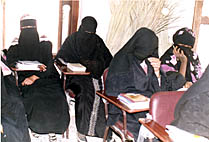
ILLITERACY: Latter-Day Plague [Archives:1998/37/Culture]
September 14 1998
Sponsored by the Illiteracy Eradication and Adult Education Organization (IEAEO), a special ceremony was held in Sanaa to mark World Literacy Day (September 8). The event was attended by the Prime Minister, Dr. Abdulkarim Al-Iryani, who stressed the need to intensify all efforts in order to eliminate illiteracy in Yemen. He also emphasized his government’s commitment to provide all possible assistance to help implement the necessary plans and programs in this respect.
Ms. Fawziya Noman, chairwoman of IEAEO told Yemen Times: “Adult education is the means to raise the levels of creativity and productivity in this nation.”

Mr. Al-Midhwahi goes on to enumerate the problems facing his organization at the moment:
1- lack of funds which are really decreased every year, instead of being increased to allow more illiterate people to join up;
2- people employed are mainly primary school teachers, not qualified to teach adults;
3- curricula used are now old and in need of updating.
“A special committee is now working on authoring new books for adult education, taking into account the learning requirements for rural and urban men and women,” explained Mr. Al-Midhwahi. It is expected that new curriculum will be ready by the next academic year.
Ms. Fawziya Noman indicated that women are specially targeted by the program to eradicate illiteracy, in view of the high proportion of illiterate females in Yemeni society. “Our program does not include literacy classes only, but women are also taught various useful handicrafts to help them generate more income to support their families,” announced Ms. Noman.
“Over a period of two years, illiterate adults are taught to read, write and do simple arithmetic,” said Mr. Al-Midhwahi. Added Ms. Noman, “unfortunately many women do not go the full learning courses due to their home and family demands.” This is especially so in rural areas, where there not enough literacy centers and women have do more work at home and on the farm, both Ms. Noman and Mr. Al-Midhwahi agreed.
Ahlam Al-Mutawakil,
Yemen Times
——
[archive-e:37-v:1998-y:1998-d:1998-09-14-p:./1998/iss37/culture.htm]


